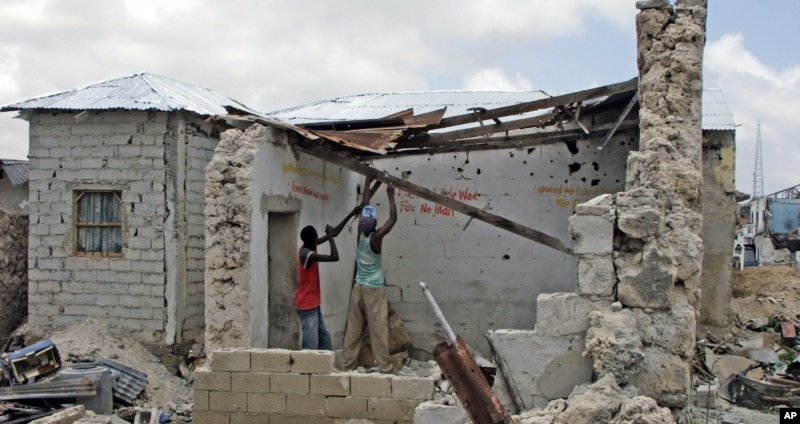
Saturday, July 07, 2012
Mohammed Yusuf

The sound of hammers has replaced the sound of machine guns in the streets of Mogadishu. Construction is going on everywhere for new homes, hotels and shopping malls. Businesses are thriving, government institutions are being renovated and building owners are reclaiming their property from squatters.
Hassan Sankay Ali, a sawmill owner in a district known as Kilometer Five, said there has been high demand for building materials, and due to that demand prices have risen.
People are coming out to buy building materials, Ali said. Most of the people coming to buy are either building new houses or renovating existing homes.
During 21 years of anarchy, Mogadishu's infrastructure was reduced to rubble. Now enjoying its longest period of relative peace, the city is making notable progress.
A new warehouse is going up in Kilometer Five. Construction manager Mohamed Hussein said buildings in that area were destroyed after years of fighting, but people have begun rebuilding. He said construction started when government forces took full control of the district six months ago.
"People are looking for a place to live," he said. "They want to live."
Anarchy in Somalia had become "normal," Hussein said, and it seemed to be never-ending. But, he added, "at the end of the day people want shelter - a place they can call home."
Limited resources, big demand
Mogadishu's mayor, Mohamed Ahmed Nur, told VOA he has limited resources and it is hard to compile an overall look at the city's construction boom.
“We are struggling with the basic services," he said. "So I cannot give you the exact figure, but I can tell you that the figure is huge. ... Wherever you, go every sound you will hear is hammer and nail, rather than hearing the bullets.”
People are getting their lives restarted in Mogadishu, but the return of security and order is still a long way off. In some neighborhoods clan-based militias control the government's checkpoints, in a clear reminder of chaos that dominated the city for years.
Expatriates flock back
The economic boom is fueled by expatriates flocking back and investing millions of dollars. This provides jobs for thousands of young militiamen eager to get out of the killing business.
Mohamud Hareed Dagey came from London six months ago and opened a new restaurant near Lido Beach, and he also plans to build a hotel. He said more Somalis living abroad must return home to build the economy.
He said at least 40 people work in his restaurant, and that those jobs are more important than his profits. “What is important,” Dagey said, “is creating jobs for people. If we create jobs we can tell people: 'lay down your arms, come to work and improve your livelihood.'”
Dagey said unemployment has caused young people to join militias and make their livelihood through extortion and killing.
Businessmen hope a political transition leading up to the election of a president - a vote due to take place next month - will sustain this new cycle of peace and prosperity. But amid the past six months of hope and optimism here in the capital, security is still a major concern.